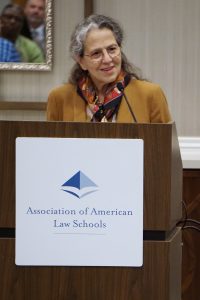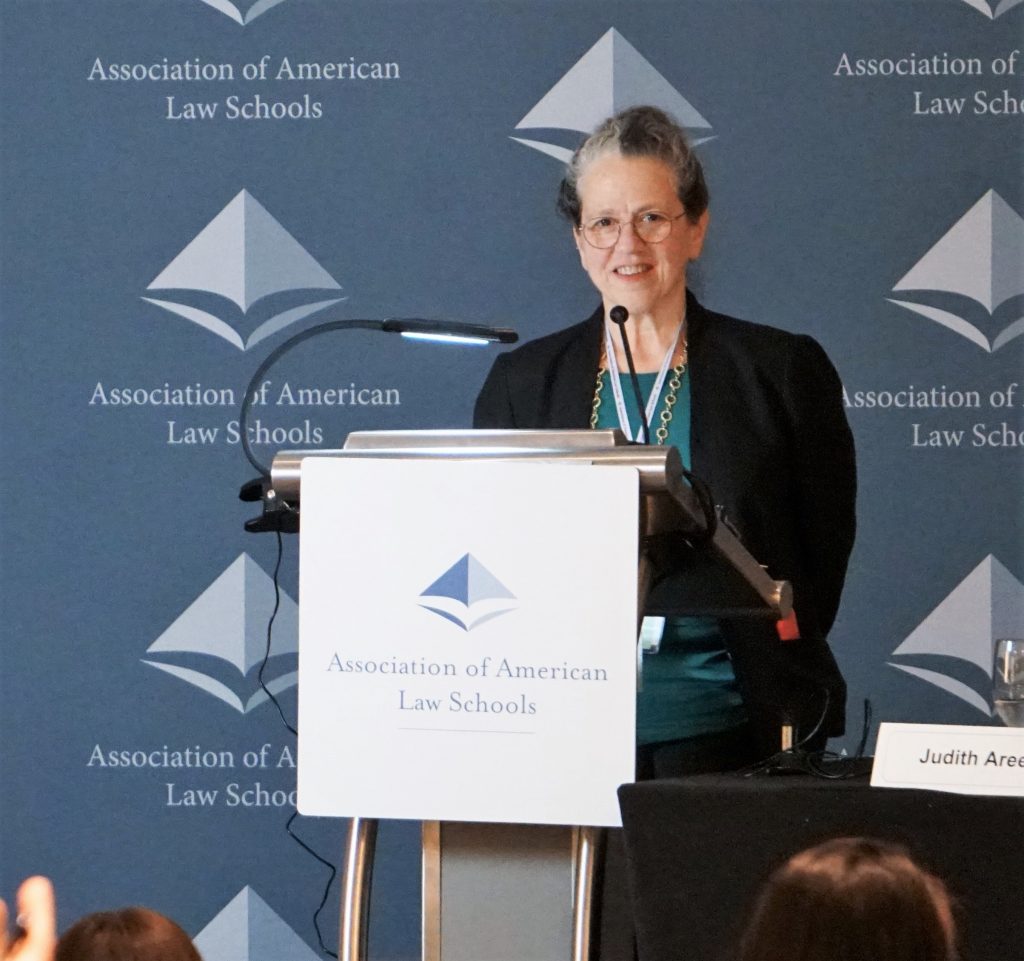
Civic education is foundational in constitutional democracies and can be accomplished in many ways—but, however it is accomplished, civic education depends on knowledge of basic institutions established under the law of the Constitution. Without a public knowledgeable of the practices, institutions and attitudes that support constitutional democracy, maintaining the commitments of both law and democracy becomes much more difficult.
Danielle Allen, James Bryant Conant University Professor at Harvard, describes a “disinvestment” in civics education over the last half century. Professor Allen links this disinvestment to declining support for the importance of living in a democracy among young people. (Op Ed, Washington Post, Sept. 5, 2019). Scholars of democratic erosion are paying renewed attention to public knowledge, attitudes, “emancipatory orientations” and “prodemocratic values.” (See Ginsburg and Huq, How to Save a Constitutional Democracy [2018]). What some political scientists call “countermobilizations” to oppose democratic erosion, are possible only if people know how to monitor and recognize threats to democracy and the rule of law and are also familiar with the mechanisms of successful political mobilization or protest campaigns.
But education for participation in democratic citizenship in a complex republic under the law of the Constitution should not be viewed as the province only of grades K through 12. It calls for knowledge of the basic institutions of government, which find their roots in the Constitution, and of an appreciation of the demands of tolerance, openness, and fairness in a complex and pluralistic society. These are demands with which lawyers, law students and law professors are all familiar. We are thus well-situated (and, perhaps, professionally obligated) to play a role in enhancing a civically knowledgeable public.
In 1953, Professor Paul Freund argued in a lecture at Washington University that the study of law had much to contribute to the “general education” offered by universities. For Freund, the point was not to teach technical aspects of law, but rather the methods of law, and the development of law over time—because, as he put it, “the institutions which are central to our civilization—security of the person, freedom of the mind, ownership, and the intercourse of trade—and which at the same time are the substance of our daily living, are all dependent on a structure of law.” Indeed, while acknowledging other legal methods, for Freund, “the most important of legal methods [is] that of translating into institutions the ideals and purposes of a society,” as exemplified by the career—before becoming a judge—of Louis Brandeis. More familiarity with lawyers’ methods in society might, he suggested, prevent tragic “mistakes of judgment,” because “[i]t is the business of a lawyer to seek for evidence and to ask questions, the questions that go to the heart of the matter.” Amy Gutmann, now President of the University of Pennsylvania, has emphasized the relationship between education and democracy, arguing that “learning how to think carefully and critically about political problems, to articulate one’s views and defend them before people with whom one disagrees, is a form of” education to “which universities are well-suited.” (Democratic Education, 1999). Universities’ obligations to “actively foster students’ understanding of … democracy’s essential institutions” have been recently discussed by the president of Johns Hopkins University, a former law school dean himself. (Ronald Daniels, “The University’s Covenant with Liberal Democracy,” 2018).
Appreciation of the need for “law-related education” about matters of civic concern has extended to earlier years of education, even as older forms of civic education have declined. In 1993 Mark Alexander, then a recent law school graduate who had run a Street Law Clinic and now Dean of Villanova University Charles Widger School of Law, surveyed the existing landscape of “law-related education” (LRE)—that is education about law and legal process that enables people without legal training or law degrees to better understand their rights and their governments, and how to protect their rights and participate effectively before representative organs of government, before administrative or executive bodies, and in courts. As he explained, in addition to teaching basic aspects of law itself, “LRE programs provide citizenship education and training in critical thinking skills… . LRE encourages participation in, understanding of, and general respect for our system of laws. … The development of critical thinking skills helps students resolve the difficult challenges which lie ahead. In addition, students learn values-sorting skills which help them address the value-laden problems they confront in their daily lives. When they achieve these major goals, LRE programs empower students and help create a more aware citizenry.” He contrasts such appropriate forms of civic education with inappropriate efforts, in some older approaches, to “impose narrow moralistic and nationalistic control over schools, teachers and students.” Indeed, an essential aspect of civics education is to develop minds that are critical and inquiring, as well as knowledgeable and well-informed, and the disposition to apply those minds to issues in the public sphere.
Alexander argued for a coherent law-related education program that would run every year from grades K through 12—rare, then and now. But one might expand on his idea and conceptualize civic education as an ongoing, life-long form of education in the practices, institutions, and attitudes of members of a successful constitutional democracy. Indeed, it is important for legal educators and the legal profession to engage with these issues—including examining constitutional democracy as a form of governance compared with others; as noted above, survey data suggest that the commitment of younger generations to democracy as a form of government is in decline and scholars are raising concerns about democratic “retrogression” and threats to the rule of law.
The need for civic education is not limited to university students or to students in grades K through 12. Civic education in various forms can be helpful to people of all ages, to develop or reinforce the habits of mind and action of democratic citizens. These include expecting to be treated and to treat others with equality; respecting the rights of those with whom we disagree to have their say; working to make the rules of political elections fair, inclusive, and determinate; respecting lawful means of resolving disputed questions; and taking responsibility to sustain the institutions of constitutional democracy and to help fix injustice or malfunction in those institutions or in society. Lawyers, law faculty and law students will find many opportunities to participate in this form of lifelong education, both as teachers and learners. Even those most well-versed in constitutional law and the institutions of government need to continue to learn, as significant aspects of their functioning may change through technology, mass movements of people, or new political approaches, and thus require new critical thinking and responses.
Many law schools are engaged with forms of civic education. Street Law programs have become quite widespread, after beginning at Georgetown University Law Center in 1971-72. The core idea has remained constant: law students are trained to and then teach public school students about legal issues of relevance to their lives. But today Street Law includes not only the law students who teach in the program, and their public school students, but also law firms, corporate legal departments, and police officers who participate in various Street Law programs. The current 9th edition of the Street Law textbook—Street Law: A Course in Practical Law—includes materials on what law is, lawmaking, advocacy, settling disputes, lawyers, crime and criminal procedure, juvenile justice, consumer law, tort law, family law, and individual rights and liberties as well as contemporary issues of immigration, intellectual property, law and terrorism and employment law. Writing in 1993, Dean Alexander found at least 38 different law schools had Street Law programs. This year (as of research done in January 2019, on ABA-approved law schools), 92 schools have such programs.

Another 13 schools that do not have Street Law programs have adopted a Marshall-Brennan Constitutional Literacy program. Founded at American University Washington College of Law in 1999, this program focuses on placing second- and third-year law students, as well as LL.M. students, in public “high schools to teach yearlong courses in constitutional law and oral advocacy.” A total of 19 law schools have a Marshal Brennan Constitutional Literacy program. So, 105 of the 204 law schools surveyed have student-led civic education activities.
A number of law schools have other forms of civic outreach. For example, Indiana University at Bloomington has a program called “Outreach for Legal Literacy,” which connects students at the Maurer School of Law with elementary school students in Monroe County, in a program that emphasizes active learning and a mock trial. Samford University Cumberland School of Law has a program connecting law student volunteers with high school and middle school students to prepare for simulated congressional hearings. Individual faculty initiatives contribute; for example, Martha Minow at Harvard taught a reading group in which law students prepared a civic engagement curriculum for public school students. And the Law School Admission Council recently offered a one-hour webinar on “Civic Education in Law” (Sept. 16, 2019), with Kellye Testy (LSAC CEO) and Ken Randall (iLaw President) interviewing Dean Danielle Conway (Penn State Dickinson); Dean Elena Langan (Touro); Dean Donald Tobin (Maryland); and Dean Verna Williams (Cincinnati). Many valuable insights were offered, including Dean Conway’s comment that “the beauty of the rule of law” is that “[t]he rule of law belongs to all of us.”
But could we in legal education be doing more? Is our society in urgent need of being reminded of, or learning, the histories that led to the creation of the institutions of representative democracy? the separation of powers? written rights protecting even those accused of heinous offenses? rights of equality and due process of law? independent courts? Are those histories, and those legal institutions, still valuable today? Or have the lessons of history and practice changed? However these questions are answered, law schools are good places for the inquiries—and for providing broader forms of civic engagement so that, in our representative democracy, more people have a better understanding of their rights, their governments, their choices, the stakes, and how to analyze them.